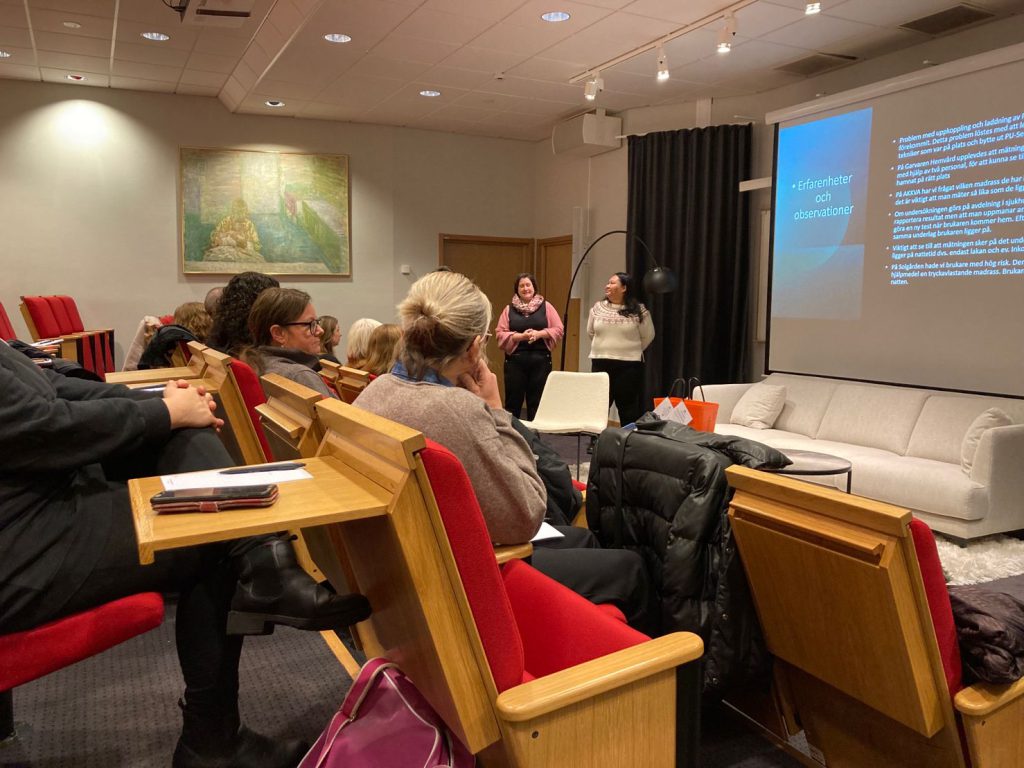During the autumn, participants from the one-year YH training course "Digitalisation leaders in the welfare sector" tested digital tools for real in their businesses. This week, the first students gathered in Arvika for their examination.
The training is anchored directly in the regular work and aims to increase knowledge of how digital health services, technology development and digitization can be used as enablers and applied practically in healthcare.
Possibility to test solutions in a real environment
During the training, the participants have applied their knowledge in a real environment at their workplace. By introducing new solutions in the educational context, users are supported in trying them out and spending time with them, with the advantage that they can later lead the development in their business themselves. The tests have given the students a safe and secure structure to interact with new solutions and new insights that have opened the door to see the possibilities and also be able to convey these to management and support functions in their own organization, says Helena Söderholm and Marie Granander, education leader for the education.
- The lessons learned and conclusions that the tests have provided will also be spread outside the study groups and the workplaces that use them today. We see that the students are asked to talk about their tests around the business, which gives rise to more and broader development, says Helena Söderholm.
- There will be a good spread when the interest is also aroused in other businesses. We really see that the public sector can increase its innovation capacity in this way. It also provides good input to the companies, who get to see their services tested in real environments. Some of the services have already been procured by the municipalities and regions where they were tested, which has helped in the practical widespread introduction, says Marie Granander.

Hanna Björk is one of the participants who took the exam last Wednesday and is satisfied with the training:
- It has been very exciting, no one else had taken the training before and much was unknown ground. But overall, we have learned a lot and you see the need for digitization in a completely different way than before. All of a sudden we are talking about digitization in everyday life, we look at our own processes with new eyes and we discuss more deeply. Now it is anchored so we see what profits we can get and it is a big change in the working group.
Test of video interpretation
Hanna Björk and her study group had the opportunity to test the service Digital Interpreter – an interpretation tool that provides quick access to certified interpreters through a digital video solution.
- The previous system could create disruptions in the workflow, when the interpreter was not available it led to rebookings and more care meetings. Now we can see that not only efficiency has increased, but also the quality of care. We get into the depth in a different way with this solution and can solve the problems faster. With a video interpreter, more people get the right help faster and the medical records become more in-depth, says Hanna Björk, and continues:
- We have achieved the goals we set and took 92 percent of the meetings via video interpreter during the test period, and now it is standard in the business. But we had not counted on the other gains in quality of care. There is greater value when the aids used are based on the actual needs of the business and they are anchored in reality.
Even the companies whose services have been tested see benefits from the system.
- The continuous contact with the participants has been very interesting for us, especially having weekly follow-ups where we get thorough feedback directly from the end users. It gives us an insight into how the system simplifies and is used in healthcare, and how we can further facilitate the users, says Mikael Wall, sales manager at DigitalTolk.
Development that continues after the education
- An education like this makes it possible to develop in one's role, which in turn strengthens the entire business. That is the concept of success, says Hanna Björk.
Helena Söderholm and Marie Granander agree that the participants' development has been great during the training:
- It's fun to see how engaged the students have been in the work and their willingness to continue development even after graduation, says Helena Söderholm.
- The participants and management groups at the workplaces are motivated to make use of the knowledge they have acquired and develop how to organize around it. Some of the participants have already received other orientations in their services, new assignments and project positions to continue working with digitization, says Marie Granander.
It's almost time for new students
The second round of training starts as early as next week, and the training leaders are looking forward to receiving the next batch.
- There is both need and interest in the training, and we hope to continue to hold it for a long time to come.
Five services have been tested in different businesses:
- Digital Interpreter: Service for digital video interpretation
- Virotea: Digital service in VR for training staff about what it's like to live with cognitive impairment
- Habbie: Digital service for re- and habilitation
- Wellbee: Digital tool for support for people with cognitive impairment
- PU sensor: Digital tool for identification of bedsore risk
About the training:
The course "Digitalisation leaders in welfare" is given by the University of Applied Sciences in Arvika and is a collaboration between DigitalWell Arena, Arvika Näringslivscentrum, Arvika Municipality, Karlstad Municipality, Hammarö Municipality and Region Värmland.
Read more about the training on Arvika Näringslivscenter's website.

